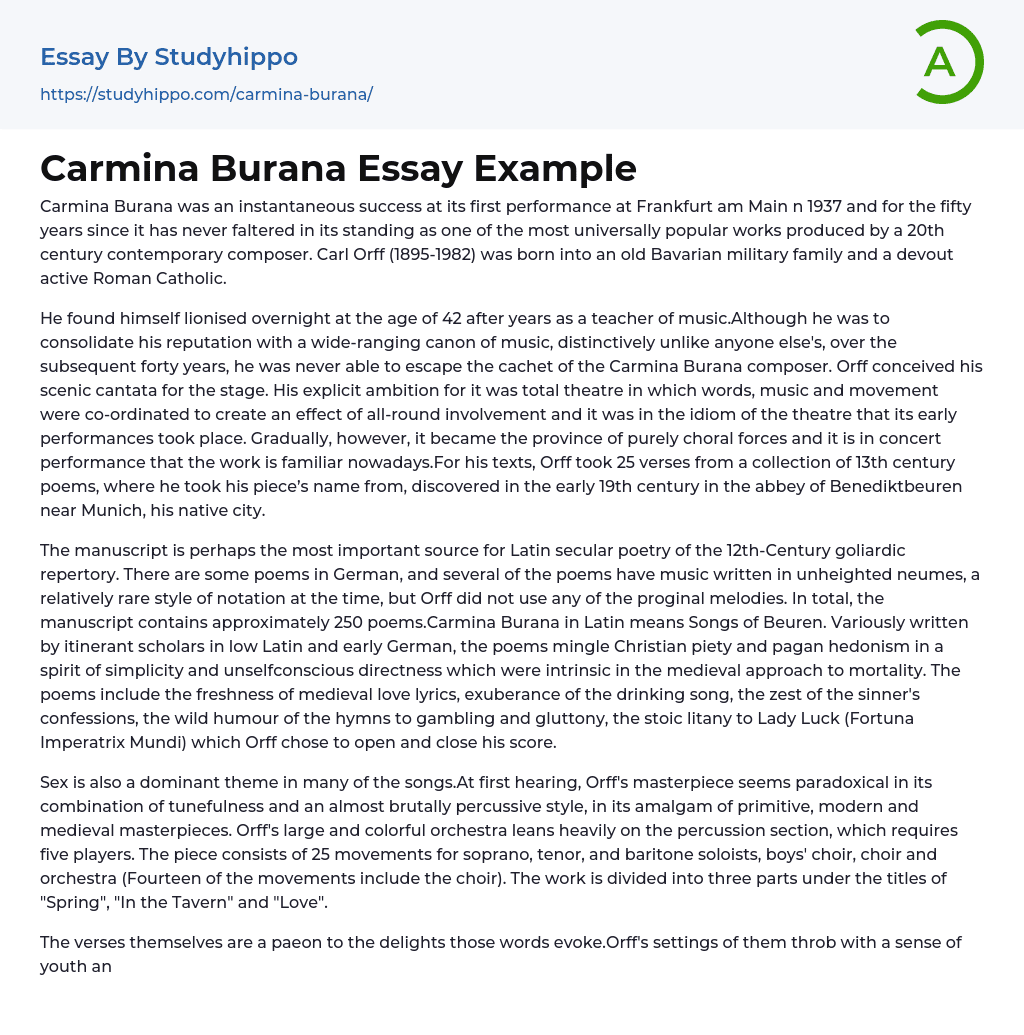Carmina Burana was an instantaneous success at its first performance at Frankfurt am Main n 1937 and for the fifty years since it has never faltered in its standing as one of the most universally popular works produced by a 20th century contemporary composer. Carl Orff (1895-1982) was born into an old Bavarian military family and a devout active Roman Catholic.
He found himself lionised overnight at the age of 42 after years as a teacher of music.Although he was to consolidate his reputation with a wide-ranging canon of music, distinctively unlike anyone else's, over the subsequent forty years, he was never able to escape the cachet of the Carmina Burana composer. Orff conceived his scenic cantata for the stage. His explicit ambition for it was total theatre in which words, music and movement were co-ordinated to cr
...eate an effect of all-round involvement and it was in the idiom of the theatre that its early performances took place. Gradually, however, it became the province of purely choral forces and it is in concert performance that the work is familiar nowadays.For his texts, Orff took 25 verses from a collection of 13th century poems, where he took his piece’s name from, discovered in the early 19th century in the abbey of Benediktbeuren near Munich, his native city.
The manuscript is perhaps the most important source for Latin secular poetry of the 12th-Century goliardic repertory. There are some poems in German, and several of the poems have music written in unheighted neumes, a relatively rare style of notation at the time, but Orff did not use any of the proginal melodies. In total, the manuscript contains approximately
250 poems.Carmina Burana in Latin means Songs of Beuren. Variously written by itinerant scholars in low Latin and early German, the poems mingle Christian piety and pagan hedonism in a spirit of simplicity and unselfconscious directness which were intrinsic in the medieval approach to mortality. The poems include the freshness of medieval love lyrics, exuberance of the drinking song, the zest of the sinner's confessions, the wild humour of the hymns to gambling and gluttony, the stoic litany to Lady Luck (Fortuna Imperatrix Mundi) which Orff chose to open and close his score.
Sex is also a dominant theme in many of the songs.At first hearing, Orff's masterpiece seems paradoxical in its combination of tunefulness and an almost brutally percussive style, in its amalgam of primitive, modern and medieval masterpieces. Orff's large and colorful orchestra leans heavily on the percussion section, which requires five players. The piece consists of 25 movements for soprano, tenor, and baritone soloists, boys' choir, choir and orchestra (Fourteen of the movements include the choir). The work is divided into three parts under the titles of "Spring", "In the Tavern" and "Love".
The verses themselves are a paeon to the delights those words evoke.Orff's settings of them throb with a sense of youth and exuberance unshadowed by the sobrieties of moral rectitude or religious moderation. Throughout all his music he made a virtue of simplicity and an incessant rhythmic pulse and stylized configurations of harmonies, structured in massive blocks for large orchestral and choral forces, are the interacting elements which distinguish Carmina Burana. The exhiliration his music generates is that of both the flesh and the spirit.
Contents •Fortuna Imperatrix Mundi
(Fortune, Empress of the World) o1. O Fortuna o2. Fortune plango vulnera •I. Primo vere (In Springtime) 3. Veris leta facies (No strings and only a small chorus) o4. Omnia sol temperat o5.
Ecce gratum • Uf dem anger (On the Lawn) o6. Tanz o7. Floret silva nobilis (Small and large choruses) o8. Chramer, gip die varwe mir (Small and large choruses) [German] o9. Reie [German] o10. Were diu werlt alle min [German] •II.
In Taberna (In the Tavern) o11. Estuans interius o12. Olim lacus colueram (No violins used) o13. Ego sum abbas (Only percussion and brass with chorus) o14. In taberna quando sumus •III.
Cour d'amours (The Court of Love) o15. Amor volat undique (Boys chorus with soprano) o16.Dies, nox et omnia o17. Stetit puella o18. Circa mea pectora o19.
Si puer cum puellula o20. Veni, veni, venias (Double chorus with 2 pianos & 6 percussionists) o21. In truitina o22. Tempus est iocundum (2 pianos, percussion and all vocalists except tenor) o23. Dulcissime • Blanziflor et Helena (Blanziflor and Helena) o24.
Ave formosissima (Three glockenspiels with independent parts) • Fortuna Imperatrix Mundi (Fortune, Empress of the World) o25. O Fortuna (Fortune, Empress of the World) Bibliography: www. classical. net www. athenapub.
com/14carmina members. optus. com. au/~charles57/Carmina
- Band essays
- Baroque Music essays
- Blues essays
- Classical Concert essays
- Classical Music essays
- Concert essays
- Hip Hop essays
- Jazz essays
- Ludwig Van Beethoven essays
- Michael Jackson essays
- Mp3 essays
- Music Concert Report essays
- Music Reference essays
- Music video essays
- Musical Instruments essays
- Opera essays
- Piano essays
- Popular music essays
- Recording essays
- Rock And Roll essays
- Rock Music essays
- Singing essays
- Sonata essays
- Song essays
- Sonnet essays
- Tupac shakur essays




